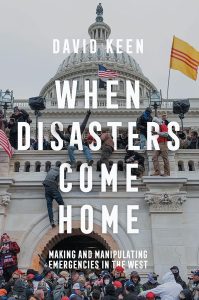In When Disasters Come Home: Making and Manipulating Emergencies In The West, David Keen considers how powers in the Global North exploit, or even manufacture, disasters in the Global South for political or economic gain. Though taking issue with Keen’s engagement with psychoanalysis, Daniele-Hadi Irandoost finds the book an insightful exploration of the global power dynamics involved in disasters and their far-reaching repercussions.
When Disasters Come Home: Making and Manipulating Emergencies In The West. David Keen. Polity. 2023.
 In When Disasters Come Home: Making and Manipulating Emergencies In The West anthropological writer David Keen attempts to show how disasters are exploited for political and economic gain. A disaster, as defined by Keen, is “a serious problem occurring over a short or long period of time that causes widespread human, material, economic or environmental loss”. Keen’s analysis deals with two types of disaster in the Global North. The so-called “sudden” or “dramatic” disasters are caused by stark terrorism (eg, the 9/11 attacks), natural causes (Hurricane Katrina), financial and economic recessions (crash of 2007–8), migration crises (Calais), Covid-19, and the war in Ukraine.
In When Disasters Come Home: Making and Manipulating Emergencies In The West anthropological writer David Keen attempts to show how disasters are exploited for political and economic gain. A disaster, as defined by Keen, is “a serious problem occurring over a short or long period of time that causes widespread human, material, economic or environmental loss”. Keen’s analysis deals with two types of disaster in the Global North. The so-called “sudden” or “dramatic” disasters are caused by stark terrorism (eg, the 9/11 attacks), natural causes (Hurricane Katrina), financial and economic recessions (crash of 2007–8), migration crises (Calais), Covid-19, and the war in Ukraine.
Keen attempts to show how disasters are exploited for political and economic gain.
On the other hand, “extended” or “underlying” disasters derive from long-smouldering conditions of economic disparity (eg, globalisation and inequality), considerable changes in climate (deficiencies in the domestic infrastructure), as well as political fragmentation (erosion of democratic norms, etc).
Colonial historiography assumed that disasters were usually confined to the Global South. Incidentally, in his investigative research in the Global South, especially in Sudan, Sierra Leone, Sri Lanka, Keen discovered that the politics of that world were disposed to deliberately make, manipulate and legitimise “famines, wars and other disasters”. This state of affairs enabled certain beneficiary actors to extract political, military and economic benefits.
In his investigative research in the Global South, especially in Sudan, Sierra Leone, Sri Lanka, Keen discovered that the politics of that world were disposed to deliberately make, manipulate and legitimise famines, wars and other disasters
Here, Keen sounds a note of warning. Democracies provide only a fragile protection against disasters, and for six reasons (according to examples across the globe): disasters might be deemed “acceptable”, vulnerable groups do not always have the “political muscle” to guard against disasters, opportunists may seek to maximise profit through the suffering of certain groups, “elected politicians” may “distort” information about a disaster, democracies “may give false reassurance in terms of the apparent immunity to disaster” (emphasis in original), and, finally, a democracy may itself erode over time.
In theorising disasters, Keen endeavours to advance beyond the traditional distinction between the Global North and the Global South.
In theorising disasters, Keen endeavours to advance beyond the traditional distinction between the Global North and the Global South. His purpose is to show that, in the Western world, disasters have “come home to roost”, that the violence of “far away” countries (“whether in the contemporary era or as part of historical colonialism”) has found its way back into the Global North in the form of “various kinds of blowback”.
These “boomerang effects”, to use Keen’s words, “take a heavy toll on Western politics and society” when they are “incorporated into a renewed politics of intolerance” (“internal colonialism”). In particular, Keen says that, in the Global North, we find there is an increasing drive for security by “allocating additional resources for the military, building walls, and bolstering abusive governments that offer to cooperate in a ‘war on terror’ or in ‘migration control’ – … [which] tend not only to bypass the underlying problems but to exacerbate them” (emphasis in original). Additionally, Keen alleges that the expenses of “security systems” suck “the lifeblood from systems of public health and social security, which in turn feeds back into vulnerability to disaster”.
there is an increasing drive for security […which] tends not only to bypass the underlying problems but to exacerbate them
As Keen sees it, disasters either “hold the potential to awaken us to important underlying problems”, or “keep us in a state of distraction and morbid entertainment”, finding it important to consider their causes rather than their consequences.
Keen draws upon a wide selection of literature, covering authors including Naomi Klein, Mark Duffield, Giorgio Agamben, Ruben Andersson, Amartya Sen and Jean Drèze, as well as Michel Foucault, Susanne Jaspers, Arlie Russell Hochschild, Richard Hofstadter, and Nafeez Ahmed, among others. He pays particular attention to the work of Hannah Arendt. Her 1951 work, The Origins of Totalitarianism is a powerful and permanently valuable account of the way in which politics is framed “as a choice between a ‘lesser evil’ and some allegedly more disastrous alternative”.
[Arendt’s] 1951 work, The Origins of Totalitarianism, is a powerful and permanently valuable account of the way in which politics is framed ‘as a choice between a ‘lesser evil’ and some allegedly more disastrous alternative’.
Keen competently summarises her exposition of “action as propaganda,” upon which reality is prepared to conform to “delusions”. From his point of view, “action as propaganda” is represented by five distinct methods namely, “reproducing the enemy” (war on terror), “creating inhuman conditions” (police attacks in Calais), “blaming the victim” (austerity programmes in Greece), “undermining the idea of human rights” (the growing emphasis on removing citizenship in the UK), and “using success to ‘demonstrate’ righteousness” (Trump’s self-proclaimed powers of prediction).
Keen’s discussion of these strategies to exert control resonates with contemporary politics in the UK. One is reminded of the retrogressive character of Home Secretary Suella Braverman’s article for the Times on 8 November 2023, in the context of the Israel-Hamas war and the Armistice Day, suggesting that pro-Palestine protesters are “hate marchers”, and that the police operate with a “double standard” in the way they handle pro-Palestinian marches. This is, of course, one example of the insidious process of “painting dissent as extremism”.
Nevertheless, Keen’s use of “magical thinking”, or “the belief that particular events are causally connected, despite the absence of any plausible link between them”, is one aspect of his argument that struggles to convince. Keen is persuaded that “magical thinking” links up with a well-developed science of psychoanalysis in accordance with Sigmund Freud’s conception of the magical and how people affected by neurosis may turn away from the world of reality. But the impression given by Keen’s economic or anthropological perspective is that he may have overlooked the complexity of psychoanalysis.
Keen is persuaded that “magical thinking” links up with a well-developed science of psychoanalysis in accordance with Sigmund Freud’s conception of the magical and how people affected by neurosis may turn away from the world of reality
Here, we come to two of the chief problems of what “magical thinking” really means. First, according to Karl S. Rosengren and Jason A. French, magical thinking is “a pejorative label for thinking that differs either from that of educated adults in technologically advanced societies or the majority of society in general”. Second, they found, “it ignores the fact that thinking that appears irrational or illogical to an educated adult may be the result of lack of knowledge or experience in a particular domain or different types of knowledge or experience”. It is necessary, therefore, to understand the writings of Freud as the product of their locus nascendi. That is to say, it is dangerous to politicise the processes of psychology, or, to be more exact, to apply them outside the formalities of therapy.
To conclude, When Disasters Come Home is a book to which all those interested in current affairs, geopolitics and development studies must come sooner or later, abounding in illuminating extrapolations on the ruling and official class’s exploitation (or even manufacture) of disasters.
This post gives the views of the author, and not the position of the LSE Review of Books blog, or of the London School of Economics and Political Science. The LSE RB blog may receive a small commission if you choose to make a purchase through the above Amazon affiliate link. This is entirely independent of the coverage of the book on LSE Review of Books.
Image Credit: Kenneth Summers on Shutterstock.





